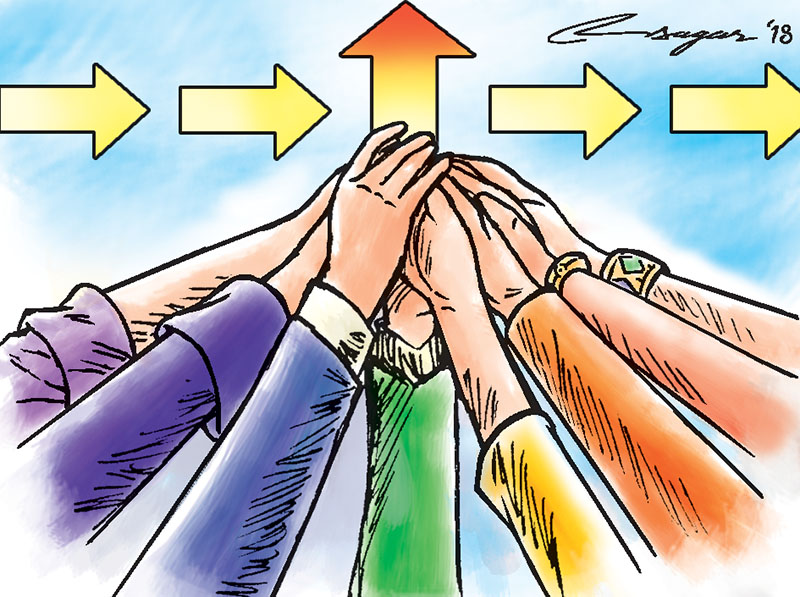Agents of change: Youth voice matters
Young people indeed have the power to make a difference. Young people in all the countries are a major human resource for development and often work as key agents for social change, economic development and innovation
I had the privilege of being part of UN Youth Nepal for seven-eight years. I first got involved in it as a medical student. I enjoyed the youth participation in decision making process at UN events in Kathmandu so much that I also got involved in the national conference of youths involved in the peace process. I really enjoyed learning about how cultural, economic, political, geographic and social factors shaped a nation’s foreign policy.
UN Youth gave me a global perspective. My desire to pursue an international career as an adult was largely inspired by the exposure to international relations through the United Nations. I also made wonderful friendships through UN Youth.
Serving as an officeholder in UN Youth was also a formative experience. I began my involvement as an officeholder in the capacity of a medical student representative in Kathmandu. I also served as a medical student national coordinator. I later served as the national executive for two years, including one term as national president. It was a challenging, but exhilarating, experience to oversee a large volunteer organisation. Every day I was heartened by the enormous amount of work our volunteers put into running events for students all across Nepal. Working with UN Youth volunteers showed me that young people indeed have the power to make a difference.
This organisation has forged solidarity with the youths of other countries and worked together for the noble cause of building an international society based on peace, social justice harmony, common prosperity and unity.
We (youth and students of Nepal) would like to contribute to achieving our common interest of making Nepal a prosperous nation. We work to further these goals and promote increased public awareness and debate on these crucial international issues. Our aim is to get young people more involved in global governance and foster greater awareness and understanding between people and cultures. We share and raise the voice of Nepal government as well as issues and concerns related to the United Nations.
So first of all, let’s talk about the Youth Delegate.
The Youth Delegate will be a Nepali citizen aged 18-30. UN youth delegates recognise that the official participation of youth is 15 -30, however, for reasons of security and in order to avoid issues of local parents, we are recommending initially that all applicants should be 18 years of age or above. In addition, they will have various preferred personal traits and skills. Youth representatives need to be culturally sensitive and be able to represent the diversity of young people in Nepal. They must be resourceful, versatile, tactful, able to work as part of a team and have strong analytical, interpersonal and communication abilities. They should enjoy keeping up with current affairs – whether political, economic, industrial, social or cultural – and should have a demonstrable interest in the UN.
The General Assembly reiterated this in calling upon member states to: “include youth representatives in their national delegations to the General Assembly and other relevant UN meetings, thus enhancing and strengthening the channels of communication through the discussion of youth-related issues, with a view to finding solutions to the problems confronting youth in the contemporary world.”
The government can benefit hugely from the recognition of the importance of youth participation. Young people face many challenges and problems particular to them and while young people aspire to full participation in the life of society, their voices tend to be marginalised. It is essential that youths be given a role and a voice in seeking to address the challenges. Young people in all countries are both a major human resource for development and key agents for social change, economic development and innovation.
By enabling more effective participation of young people, we can benefit from their energy, idealism, unique perspectives and innovative and creative ideas. Young people are the experts on the issues that affect them and as such are integral to achieving effective and enduring solutions. By empowering young people to participate more fully in society and decision making, they become engaged as partners in shaping the world they will inherit and pass on to future generations.
The creation of a youth representative position has the benefit of empowering an often marginalised sector of society as well as leading to more appropriate and effective solutions to problems facing young people. The existence of such a position would be a tangible demonstration by the Nepal government of their commitment to young people, improving relations between the government and Nepali youths. Promoting youth representation and participation in events such as the UN General Assembly can inspire young people to become more involved in international issues.
Youth representatives have demonstrated themselves to be of great value to their governments and foreign ministries have benefited from fresh perspectives and new ideas. Ultimately, a Youth Delegate as part of the Nepali mission will allow Nepal to claim the legitimacy of representing the views of Nepali youths and to promote the voice of the young Nepali people in global decision-making.
Banjade is president, UN Youth Nepal






